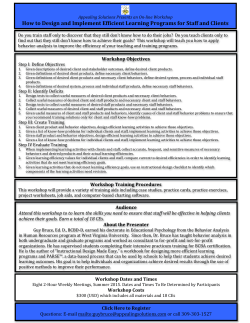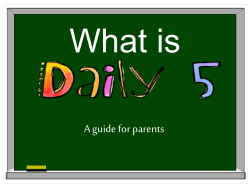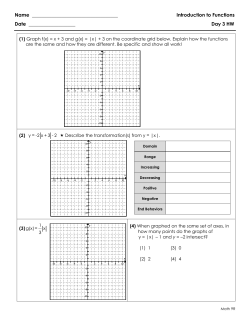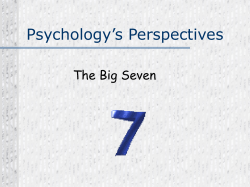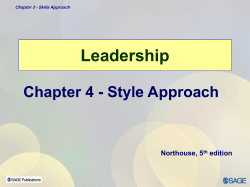
The effect of Students` undIscIplIned behavIors upon SocIal
European Journal of Educational Studies 7(1), 2015 European Journal of Educational Studies 7(1), 2015 © 2015 Ozean Publication THE EFFECT OF STUDENTS’ UNDISCIPLINED BEHAVIORS UPON SOCIAL STUDIES TEACHERS’ INSTRUCTIONAL PERFORMANCE EMINE OZEL Education Faculty, Dumlupinar University, Kutahya, Turkey E-mail address for correspondence: ozelemine@yahoo.com __________________________________________________________________________________________ Abstract: Education is a set of performances which enables improvements to carry on in a sequential way Teacher performance, especially, is the main acceleration of this integrated progress. Teachers’ highperformance that covers the management of human and material resources in a social studies class will closely affect the effectiveness and efficiency in education. Continuous undisciplined behaviors of students in class are effective on this performance. This descriptive study, conducted on 133 social studies teachers employed at secondary schools, has tried to determine the level of the effects of students’ undisciplined behaviors on social studies teachers' instructional performance. As a result of the research, it was concluded that the effects of the students’ continuous undisciplined behavior on teaching during social studies course is a lot and negative on the other students. Because of these undisciplined behaviors during the lesson, social studies teachers have difficulty in following the lesson plan, are not keen to provide extracurricular activities, follow a routinized course and cannot provide an enjoyable course to students. Keywords: Students’ undisciplined behavior, instructional performance, teacher __________________________________________________________________________________________ INTRODUCTION No matter which sector it serves in, for a business organization, performance is a strategic matter because performance is a concrete idea put forward to achieve a task more efficiently and effectively. Teachers’ performance in education organizations is based on the idea that teaching, which is both human and pecuniary resource, adds additional values to students and the education system. İn this respect, it is crucial that teachers, bearing the task of raising human, should demonstrate a high level of performance in teaching (Helvaci, 2002, Isigcok, 2008, Ocak et al. 2005, Balkar and Sahin, 2010). A teacher is supposed to achieve the planned instructional experiences to accomplish teaching and achieving these experiences is a process proceeding through academic relations between the learner and teacher. Carrying on this process regularly as planned depends especially on student-based behaviors. Therefore, it is a requirement to create a learning discipline in the classroom. Learning discipline means motivating the student, planning the classroom activities, applying them, managing the class and thus achieving effective and efficient learning (Sunbul, 1996). 59 European Journal of Educational Studies 7(1), 2015 Performance competence demonstrated by the teacher is crucial for the quality of teaching because this competence is an indicator of both conscientious and formal liabilities. The main purpose of teacher performance is to form a culture in which students bear the responsibility of classroom spirit. İf a teacher feels that he hasn’t been able to achieve this goal, problems will arise in his/her individual efforts, professional perspective, his/her relations with himself and with the class and so immateriality and indifference will arise in his job. Class and student behaviors, characterized in particular by the teacher, are supposed to correspond to academic expectations. İf there are negative behaviors in class that destroy this discipline in the classroom, the teacher will divert his/her efforts to the students who carry on these behaviors and damage the routine of learning environment. These individual cases affect the instructional performance of the teacher negatively because the teacher wastes most of his/her energy and time to sustain the classroom discipline. İn Turkey, instructional performance is among the professional competence indicators. İn 2002, teacher competence in his/her domain was tried to be standardized with competence and performance studies carried out within the scope of TEDEP (Support to Basic Education Program) supported by EU (Can, 2004, Turkish Education Society, 2009, Aksit, 2006). İn this context, it is expected from teachers to form positive relations with students, to provide a relaxed learning environment, to apply constructive discipline and to set a psychological learning environment; however, these expectations also restrict the administrative power of both the teacher and the administration. İf a teacher always comes up against behavioral patterns while performing his/her task and so the lesson deviates from its aim, his/her success level in that task will decrease qualitatively and quantitatively (EARGED, 2006, Bostanci and Kayaalp, 2011). The cases encountered by teachers in the class as undisciplined behaviors are such in-class impudence as physical and verbal attacks of students from one to another, indecency, rebelling against the authority, talking aloud, lingering around the class, letting out some kind of weird sounds and not paying attention to the lesson or wasting time by being absorbed in other unrelated things during the lesson. When a teacher has to waste his/her efforts on the students how has developed such habits, the learning time is wasted and the teacher is worn out and disappointed professionally (Pala, 2005, Cankaya, 2011). Related literature has been focused on the definition, perception and solution of indiscipline cases in the class and the negative effects of these indiscipline problems on the academic instructional performance of the teacher have been ignored. İt has been established that in terms of victimhood arising from students’ undisciplined behaviors, teachers consider students’ individual characteristics and school administrations that allow such problems to exacerbate responsible (Sarpkaya, 2007, Bilir, Kuru and Tezcan, 2007). İn social studies lessons also, such behaviors of students that destroy the academic experience in class are highly likely because a single educational output is expected from students with various expectations: achieving success at pre-determined norms. Therefore, this single aim might not turn out to be accepted by or achievable for all the students. The resultant undisciplined behaviors as a reaction might also arise at different levels and might be affected by various factors that might stem from family, society or the learning environment. Whatever the reason, such undesired behaviors have negative impacts on both students and teachers and damage not only the learning environment of students but also the professional career of teachers because these discipline problems are frequently those which hamper the teachers’ academic responsibilities. Education requires discipline. Studies on undesired student behaviors in class generally provide the descriptions of and possible precautions against such behaviors; however, no sufficient research has been conducted on how such negative behaviors affect teachers. This research is on the effects of the undisciplined behaviors of students on the instructional performance of social studies teachers. The objective of the research is to determine especially which instructional performances of social studies teachers the undisciplined behaviors of students affect more during social studies course on the strength of the premise that the undisciplined behaviors of students during social studies course affect the instructional performance of the teacher of the course negatively. The research is significant in terms of determining the vital instructional performance of a teacher due to undisciplined behaviors of students during social studies course and possible precautions against such behaviors. İn this respect, the findings will enable to form a planned and qualified learning environment during social studies course and to come up with systematic and decisive precautions against the students with such behaviors. 60 European Journal of Educational Studies 7(1), 2015 METHODOLOGY The population of this descriptive research was composed of social studies teachers (133 teachers) working at secondary schools at the city center of Kutahya. The research data were acquired by applying “The Effect of Undisciplined Behaviors of Students on İnstructional Performance of Teachers” questionnaire, developed by the researcher, on social studies teachers. During the preparation process of the questionnaire, the literature was reviewed and instructional performance indicators were established for teachers. Especially while establishing the items out of instructional performance indicators, general competencies of teaching profession developed by MEB (Ministry of National Education) General Directorate of Raising Teachers, and in this context, 6 competency domains, 31 sub-competency and 233 performance competency areas, those related to teaching among sub-competencies and A3 level among elementary teaching competencies out of special domain competencies and instructional expressions determined in EARGED model “management of performance at school” were used. İn the research, as determiners of teaching service of teachers, course planning, activities, method and techniques, tools and material, content order and presentation, student communication, time, environment and counselling were used as a base. İn the research, instructional performance of social studies teachers was limited to the elements that are the determiners of teaching service and the effect of undisciplined behaviors of students on these teaching service determiners were analyzed. Considering the access to the population and possible cost, the data were gathered through “easy accessibility” method. The alpha reliability coefficient was found 0,92 during reliability analysis of the research. The questionnaire was conducted during 2013-14 academic period. Computing the means and standard deviations acquired as a result of questionnaire application, the effect of undisciplined behaviors of students on teaching and on other students were analyzed according to teachers’ opinions. RESULTS This section presents the descriptive data of and interpretations about what extent the undisciplined behaviors of students affect instructional performance of social studies teachers and variables of the effect on other students. Table 1: The effect of students displaying undisciplined behaviors on teaching during social studies course Frequency Percent M SD Too much 33 24,8 2,39 1,21 A lot 59 44,4 No effect 2 1,5 Valid Little 34 25,6 None 5 3,8 133 100,0 Total 44,4% of the participant social studies teachers expressed their opinion that the effect of the students who display continuous undisciplined behavior in the class is a lot. Table 2: The effect of students displaying undisciplined behaviors on other students Frequency Percent M Sd Very negative 47 35,3 1,82 0,82 Negative 73 54,9 No effect 2 1,5 Valid Little 11 8,3 133 100,0 Total 61 European Journal of Educational Studies 7(1), 2015 54,9% of the participant social studies teachers expressed their opinion that the students who display continuous undisciplined behavior in the class affect the other students negatively. Table 3: Differentiation of students displaying continuous undisciplined behaviors in terms of the instructional performance of social studies teachers İtems Graduation N Mean S.D. Levene sd p None 33 3,12 0,64 Little 59 2,70 0,92 İ have no difficulty in following the Sometimes 2 2,00 ,001 4,07 4,128 0,004 course plan A lot 34 2,32 0,72 Too much 5 1,00 0,001 None 33 4,15 0,75 Little 59 4,13 0,86 İ’d like to include extracurricular 1,27 4,128 0,28 Sometimes 2 4,00 0,01 activities A lot 34 3,58 0,82 Too much 5 3,60 0,54 None 33 3,45 0,83 Little 59 4,03 0,69 İ don’t follow a 3,12 4,128 0,017 Sometimes 2 3,00 0,01 routinized course A lot 34 3,58 0,60 Too much 5 3,60 0,54 None 33 3,63 0,17 Little 59 4,08 0,10 İ conduct an 8,61 4,128 0,001 Sometimes 2 3,00 0,01 enjoyable lesson A lot 34 3,64 0,21 Too much 5 3,00 0,01 Table 4: Variance analysis of the effect of students displaying undisciplined behaviors on the performance of social studies teachers Sum of df Mean F Sig. Squares Square 26,58 4 6,64 İ have no difficulty Between Groups Within Groups 80,51 128 0,62 10,56 in following the 0,001 course plan Total 107,09 132 Between Groups 8,33 4 2,085 İ’d like to include Within Groups 84,59 128 0,66 3,155 extracurricular 0,16 activities Total 92,93 132 Between Groups 9,75 4 2,75 İ don’t follow a Within Groups 63,54 128 0,93 2,918 0,02 routinized course Total 73,308 132 Between Groups 10,94 4 2,44 İ conduct an Within Groups 119,97 128 0,49 4,91 0,001 enjoyable lesson Total 130,91 132 <0,05 <0,01 According to the variance analysis of the effect of students displaying continuous undisciplined behaviors on the performance of social studies teachers; it was determined that the teachers of this course have difficulty in following the course plan (3,12, 0,64), do not include extracurricular activities (4,15-0,15), follow a routinized course (4,03-0,69) and do not conduct an enjoyable lesson. 62 European Journal of Educational Studies 7(1), 2015 Table 5: Descriptive statistics the effect of students displaying continuous undisciplined behaviors during social studies course on the performance of social studies teachers Due to the students displaying continuous undisciplined behaviors; % 1 None 2 Little 1- İ have no difficulty in following the course plan 2- İ have difficulty in planning the course 3-İ don’t want to make a course plan 4-İ teach the lesson according to individual differences 5-İ ignore student needs 6- İ take learning paces of students into account 7- İ arrange the academic life of students 8-İ use a lot of material 9-İ am keen to use technological tools in the lesson 10-İ use various teaching methods and techniques 11-İ present an enriched content 12-İ manage the teaching time well 13-İ experience no disruptions during teaching process 14-İ have communication problems with students 15-İ use limited resources 16-İ make sure of student participation in the lesson 17-İ encourage students to learn 18-İ can handle problems during the lesson 19-İ experience disruptions during teaching 20-İ arrange my lesson according to student level 21-İ use reinforcers timely 22-İ can’t provide feedback and corrections timely 23-İ correlate the subject with real life 24-İ explain the aim of the lesson 25- İ don’t pass to the next subject without making sure that the current one has been grasped thoroughly 26- İ don’t want to include extracurricular activities 27-İ make use of level and interest sets 28-İ do repetitions when needed 29-İ give enough time for learning 30- İ conduct an enjoyable lesson 31-İ arrange the physical environment in class 32- İ follow a routinized course 33-İ do academic counselling and guidance for students 34-İ provide activities to improve thinking skills of students 35-İ am not keen to give and control homework 11,3 2,3 32,3 26,3 11,3 24,8 3 Someti mes 47,4 29,3 23,3 M Sd 13,5 48,1 8,3 5 Too much 1,5 9,0 11,3 2,67 3,50 2,41 0,90 0,89 1,32 6,8 19,5 27,1 33,8 12,8 3,26 1,12 49,6 14,3 50,4 6,0 58,6 2,3 1,5 25,6 12,0 23,3 6,0 18,8 2,3 0,8 3,0 13,5 19,5 16,5 36,1 9,8 29,3 22,6 15,8 9,8 43,6 1,5 36,1 11,3 51,1 51,9 46,6 1,5 10,5 8,3 15,8 1,5 15,0 24,8 33,1 1,87 3,24 1,93 3,49 1,78 3,74 4,00 4,06 1,07 1,22 1,21 1,02 1,11 0,82 0,71 0,86 3,0 12,8 21,1 46,6 16,5 3,60 1,00 31,6 27,8 4,5 5,3 15,8 5,3 5,3 2,3 35,3 27,8 3,0 2,3 6,0 18,0 2,3 3,0 3,8 6,0 5,3 25,6 18,8 11,3 13,5 7,5 23,3 18,8 11,3 16,5 12,0 13,5 3,0 21,8 47,4 39,1 48,1 39,8 48,9 48,9 50,4 42,9 51,1 4,5 3,8 33,8 45,1 33,1 3,0 24,8 31,6 29,3 39,1 27,8 2,13 2,45 4,03 4,27 3,97 2,96 3,85 3,98 4,05 4,15 3,96 1,04 1,21 0,99 0,77 1,06 1,15 0,99 1,01 0,78 0,85 0,91 6,8 33,8 18,0 23,3 18,0 3,12 1,24 3,0 2,3 1,5 - 5,3 12,8 3,0 6,0 7,5 8,3 5,3 20,3 39,1 9,8 9,8 29,3 34,6 27,8 45,9 27,8 51,9 50,4 32,3 41,4 54,1 28,6 17,3 35,3 31,6 29,3 15,8 12,8 3,97 3,43 4,19 4,03 3,80 3,64 3,74 0,83 1,01 0,73 0,92 0,99 0,84 0,74 2,3 8,3 18,0 41,4 30,1 3,88 1,00 - 4,5 31,6 39,1 24,8 3,84 0,85 27,1 15,0 22,6 33,8 1,5 2,67 1,24 4 A lot According to the descriptive statistics, it was determined that in the face of undisciplined behaviors, 50,4% of the social studies teachers don’t arrange academic life of students, 58,6% are not keen to use technological tools, 50,4% sometimes provide feedback and corrections timely, 51,9% sometimes do repetitions and give enough time for learning and 54,4% sometimes follow a routinized course. 63 European Journal of Educational Studies 7(1), 2015 CONCLUSION & SUGGESTIONS With more than 25 million students, it is normal for Turkish education system to suffer from certain problems because it is hard to deal with human. The participant social studies teachers think that the students displaying continuous undisciplined behaviors in class effect teaching a lot and affect the other students negatively. Besides, it was found that the social studies teachers, whose students display continuous undisciplined behaviors during the lesson, have difficulty in following the course plan, don’t want to include extracurricular activities, follow a routinized course and do not conduct an enjoyable lesson. İn addition, it was also established that a great majority of these teachers cannot arrange the academic life of their students as they desire and are not keen to use technological tools. The right of education is a right that all students have at the same level. The students displaying continuous undisciplined behaviors in social studies course not only violate the education right of other students but also affect the academic performance of their teacher negatively. Therefore, organizational precautions should be taken against such students, discipline regulations should be revised accordingly, counselling and guidance services should be run seriously and a joint follow-up of the family, school and teachers should be maintained to handle such problematic students. Additionally, in order for social studies teachers to learn how to cope with the undisciplined behaviors of such students and their negative effects on the class to conduct an efficient and effective lesson, they should be provided training opportunities on conflict management, crisis management, classroom management, behavior management, communication, etc... REFERENCES Aksit, F, (2006). Performans Degerlendirmeye iliskin Ogretmen Gorusleri, Sosyal Bilimler Arastirmalari Dergisi. 2, 76-101. egitimnerede3.prosesgrup.com/upload/5_7zuqfhhw_makale%205.pdf Balkar, B, ve Sahin, S, (2010). Ilkogretim II. Kademe ogretmenlerinin ogretmen performansini degerlendirme model ve uygulamalarina iliskin gorusleri, Ilkogretim Online 9(1), 396-412. Bilir, A, Kuru, S, ve Tezcan, F, (2007). Mugla ili ortaogretim okullarinda disiplin uygulamalarina iliskin yonetici ve ogretmen gorusleri, mu sosyal bilimler enstitusu dergisi 19, 21-35. akademik.mu.edu.tr/.../aynur%20bilir%20-%20saadet%20kuru%20-... Bostanci, B. A. Ve Kayaalp, D, (2011). Ilkogretim Okullarinda Ogretmen Performansinin Gelistirilmesi, Kastamonu Egitim Dergisi 19 (1), 127-140. www.kefdergi.com/pdf/19_1/19_1_10.pdf Can, N, (2004). Ogretmenlerin Gelistirilmesi Ve Etkili Ogretmen Davranislari, Sosyal bilgiler enstitusu dergisi, 16(1), 103-119. http://sbe.erciyes.edu.tr/dergi/sayi_16/08_can.pdf Cankaya, İ, (2011). Sinif Ogretmenlerinin Karsilastiklari Istenmeyen Ogrenci Davranislari Ve Bu Davranislarla Basa Cikma Yollari, Turkish Studies - International Periodical For The Languages, Literature and History of Turkish or Turkic 6(2), 307-316. www.turkishstudies.net/DergiPdfDetay.aspx?İD=2188 EARGED, (2006). Okulda performans yonetimi modeli, Egitimi Arastirma ve Gelistirme Dairesi Baskanligi, MEB basimevi, Ankara. Helvaci, M.A. (2002). Performans Yonetimi Surecinde Performans Degerlendirmenin Onemi. Ankara Universitesi Egitim Bilimleri Fakultesi Dergisi, 35 (1-2), 155-169. Isigicok, E. (2008). Performans Olcumu, Yonetimi ve Istatistiksel Analizi. Istanbul Universitesi Iktisat Fakultesi Ekonometri ve Istatistik Dergisi, 7, 1-23. 64 European Journal of Educational Studies 7(1), 2015 Ocak, G., Karatas, S., Ocak, İ. (2005). Okulda Performans Degerlendirme Yonetimi Hakkinda Fen Bilimleri Ogretmen Goruslerinin Degerlendirilmesi (Afyon-Erzurum İl Ornegi). Erzincan Egitim Fakultesi Dergisi, 7 (2), 27-40. Pala, A, (2005). Sinifta Istenmeyen Ogrenci Davranislarini Onlemeye Donuk Disiplin Modelleri, Manas Sosyal Bilimler Dergisi, 7(3), 171-179. yordam.manas.kg/ekitap/pdf/Manasdergi/sbd/sbd13/sbd-13-17.pdf Sarpkaya, P, (2007). Yonetici, Ogretmen, Ogrenci ve Velilere Gore Resmi Liselerdeki Ogrenci Disiplin Sorunlarinin Nedenleri, Pamukkale Universitesi Egitim Fakultesi Dergisi,(2)22, 110-121. pauegitimdergi.pau.edu.tr/DergiPdfDetay.aspx?İD=275 Sunbul, A, M (1996). Ogretmen niteligi ve ogretimdeki rolleri, egitim yonelimi, 2(1), 597-607. www.pegem.net/dosyalar/.../1240-20120208173433-sunbul.pdf Turk Egitim Dernegi, (2009). Ogretmen Yeterlikleri, portal.ted.org.tr/yayinlar/Ogretmen_Yeterlik_Kitap.pdf 65 Adimokan matbaacilik, Ankara.
© Copyright 2025
